Today, Saturday 10th December, UK Feminista organised a “Muff March” to protest against a culture that drives women into having “cosmetic surgery” including so-called designer vaginas.
The group encouraged women to attend saying “Tired of cosmetic surgeons profiting from body hatred? Want to speak out against a porn culture that is driving more and more women to the surgeon’s table to get a ‘designer vagina’? Then join the Muff March!”
They explained the idea behind the muffs; “We’ve taken inspiration from the Muffia – a fantastic feminist performance artist group. Proudly wearing ‘muffs’ is also a challenge to the porn norm of women having to remove their pubic hair.”
Big Smoke’s roving reporter Jim Jepps spoke to some of the participants of the march to find out why they were marching on Harley Street;
Dr Susan Hanson from Middlesex University (left of picture on right) said “I think Female Genital Mutilation is wrong. It’s frightening when we’re encouraged to choose it as a life style choice.”
I asked her if she thought there was a parallel between cosmetic surgery here and Female Genital Mutilation around the world. She was adamant “Absolutely!”
Alex Brew from Peckham (right of picture on right) said she wanted to come because “I just thought of a slogan – ‘My Muff’s Good Stuff’. I want to challenge that feeling that we always have to change what we’ve got.”
Stephanie from Cambridge (left) told me that “I’ve come to speak out about body hatred. Pornification encourages us to believe that or bodies aren’t good enough for themselves and other people.”
Beatrix Campbell from Camden (above right, middle) said that “The fabulous things about this is these are young women who are not tired, who are just very alert to what’s going on in our culture and are just not having it. Not having the nasty hatred about their bodies. I think they’re lovely!”
Hannah Rose, from Kingston upon Thames (right), said she was at the march because she “passionately support[s] the cause. As a really young girl I remember the changes to my body during puberty and I hated the changes happening to me.”
She continued: “There was no support or information. But images and messages say that you have to look like a teenage boy, with no sign of hair or flesh. The culture encourages us to shrink ourselves. I would have had a labiaplasty if it wasn’t for the support of my Mum and I don’t want other people to have to feel the same way.”
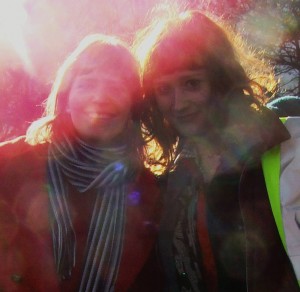
Ali Sargeant and Clare Wilcox (this is not an arty photo, I forgot I was pointing the camera straight into the sun!)
Ali Sergeant, from Camden, (left) said that there were many different “feminist strands. It’s a difficult issue to protest because it’s people’s choice.”
Ali explained that “It’s about women’s insecurity and raising awareness. I’m concerned that this is becoming rapidly normalised in or culture.”
Clare Wilcox, from West London (left), continued from where her friend left off saying “choice doesn’t exist in a vacuum. Women make choices while all around them there is a pressure to conform. This is a worrying trend if it’s going into the future. We need to open up the debate and raise the issues.”
Micheala with her sister Georgina, from Essex and Birmingham, said “We’re down for the weekend and we wanted to do something different.
“We need to tell young girls ‘what you’ve got is normal’ don’t change it for anyone. I wanted to bring my little sister along to open her eyes to what’s going on.”
Georgina agreed saying she was having a good time and it was a “Good message.”
There was a fun atmosphere, dancing and chanting as the march set off to Harley Street. UK Feminista, along with groups like UK Uncut and Occupy LSX, are setting the agenda for the next generation of activists unconstrained by some of the left’s baggage that is perhaps best left in the past.
Photos from the day in an almost random order;
All pictures are covered by Copy Left – ie feel free to use for right-on, non-profit purposes. If you want to accredit Big Smoke (Jim Jepps) that would be nice, but is not necessary.

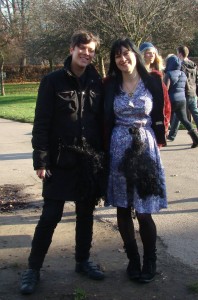


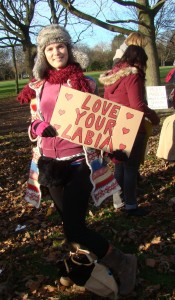
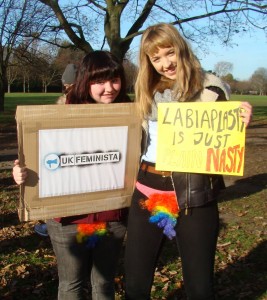
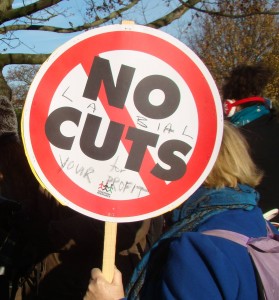
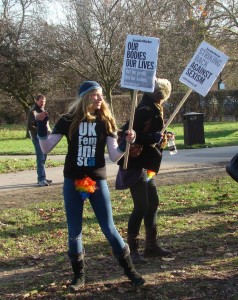


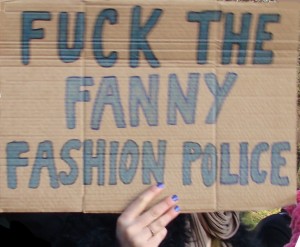
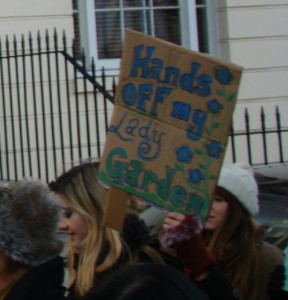
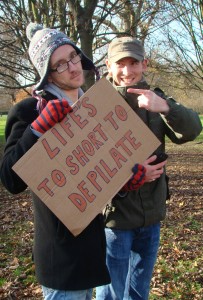



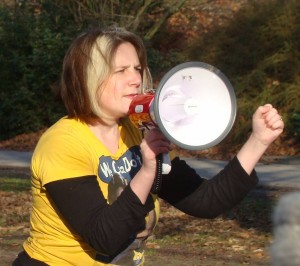
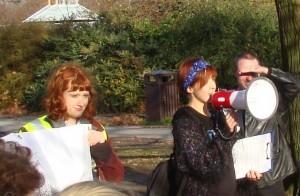

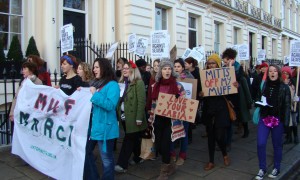
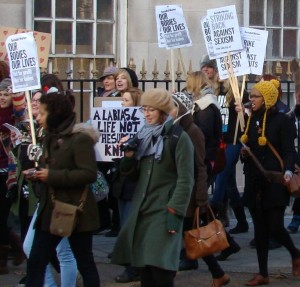

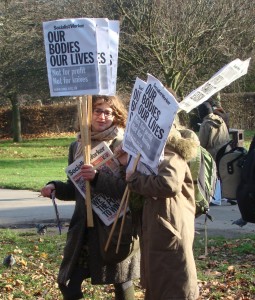
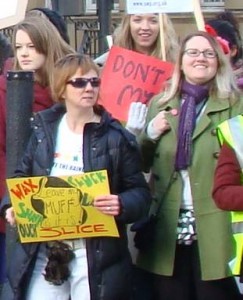
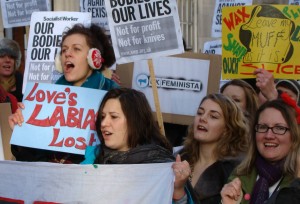

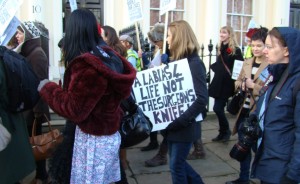
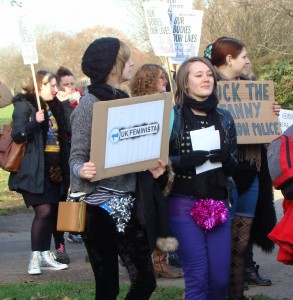



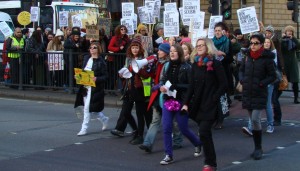
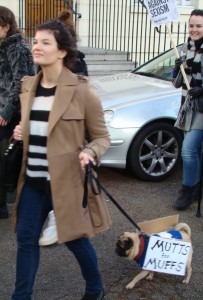



2 Comments
QUOTE: “We need to tell young girls ‘what you’ve got is normal’ don’t change it for anyone. I wanted to bring my little sister along to open her eyes to what’s going on.”
I actually think we need to tell young girls that what they’ve got is SPECIAL, don’t change it for anyone. Not normal. The concept of “normal” at all can only be harmful, when everyone is unique. People need to celebrate and cherish their difference, not be reassured that because “what they’ve got is normal”, they don’t need to change it. It implies that if they weren’t normal, they would need to change it. And when there is no real norm, the benchmark of normality becomes an arbitrary construct on the part of whoever – the media, society, peers, whoever. So, don’t say, “don’t worry, you’re normal.” Say “don’t worry, you’re different! You have a unique selling point: you are unique. Enjoy it.”
Hi Arwen.
I’ve some sympathy with what you’re saying but I think I’m leaning towards the woman who wanted to go with ‘normal’ rather than ‘special’ – if I can put it that way.
It is normal to be different but the images we are bombarded don’t just portray one version of conventional beauty – they emphasise ‘problems’ that need to be fixed.
It is not unusual for a woman to have a bit of a tummy, say, and it’s helpful to women who do to know they are not alone and that what they have is lovely. I personally think that is the strongest defense against the idea that having any fat on you is a disfigurement.